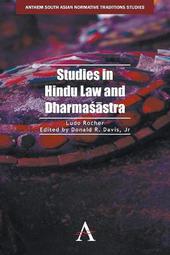
|
Studies in Hindu Law and Dharmasastra
Paperback / softback
Main Details
| Title |
Studies in Hindu Law and Dharmasastra
|
| Authors and Contributors |
By (author) Ludo Rocher
|
|
Edited by Donald R. Davis, Jr
|
|
Foreword by Richard W. Lariviere
|
| Series | Anthem South Asian Studies |
|---|
| Physical Properties |
| Format:Paperback / softback | | Pages:760 | | Dimensions(mm): Height 229,Width 153 |
|
| Category/Genre | Hindu sacred texts |
|---|
| ISBN/Barcode |
9781783083152
|
| Classifications | Dewey:294.5926 |
|---|
| Audience | | Professional & Vocational | |
|---|
|
Publishing Details |
| Publisher |
Anthem Press
|
| Imprint |
Anthem Press
|
| Publication Date |
1 October 2014 |
| Publication Country |
United Kingdom
|
Description
The main sources for an understanding of classical Hindu law are the Sanskrit treatises on religious and legal duties, known as the Dharmasastras. In this collection of his major studies in the field, Ludo Rocher presents essays on a wide range of topics, from general themes such as the nature of Hindu law to technical matters including word studies and text criticism. Rocher's deep engagement with the language and worldview of the authors in the Dharmasastra tradition yields distinctive and corrective contributions to the field. This collection serves as an invaluable introduction to a leading authority in the field of Indology.
Author Biography
Ludo Rocher is W. Norman Brown Professor Emeritus of South Asia Regional Studies at the University of Pennsylvania. Donald R. Davis, Jr. is associate professor of South Asian religions at the University of Wisconsin-Madison.
Reviews'Donald Davis, Jr. and the Anthem Press are to be applauded for undertaking this massive project. Indologists who already know Rocher's work will deeply appreciate that a ready means of accessing it now exists. For those unfamiliar with Rocher's work, this volume provides a significant counterbalance for the general study of the Indian tradition, standing as a corrective for a field that has long been dominated by a one-sided focus on religion.' -Herman Tull, 'Journal of Hindu Studies'
|